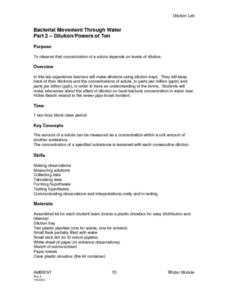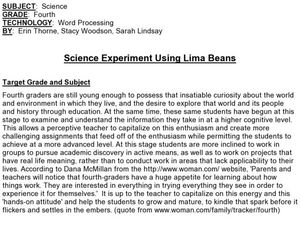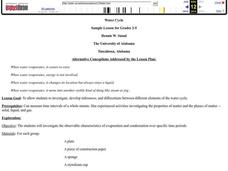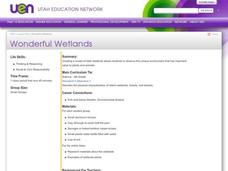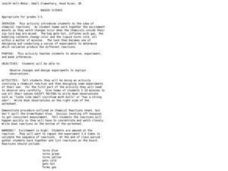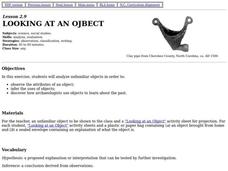Curated OER
Archaeology of the Future
Students view pictures of classmates' homes, make list of different objects in picture, and discuss what they can tell about place from evidence in picture. Students then observe artifact pictures, and read and complete artifact chart.
Curated OER
What We Know About Dinosaurs?
Third graders determine what can and cannot be learned from fossils. In this fossils lesson, 3rd graders discuss what can and cannot be learned from fossils, then students create and observe their fossils.
Curated OER
Acid and Base Testing 2
Students design and conduct an experiment on unknown solutions after studying descriptions of indicators and the way in which they identify acids and bases. Students must gather, organize, and analyze data as well as make inferences...
Curated OER
Bacterial Movement Through Water Part 2- Dilution/Powers of Ten
Students make dilutions using dulution trays. They keep track of their dilutions and the concentrations of solute, to parts per million (ppm) and parts per billion (ppb), in order to have an comprehension of the terms. Students make...
Curated OER
Growth of a Bean Documented by Child and Camera
Third graders photograph the growth of a bean plant and keep a daily written journal of observations. They drew, graphed and took notes on the plant growth which they compared to the photographic journal.
Curated OER
More on Temperature and Solubility
Learners discover how temperature effects the solubility of solutes by experimenting with a range of temperatures. They develop skills for observing, inferring, measuring, comparing and contrasting.
Curated OER
Experiences and Experiments - There is a Difference
Sixth graders plan and conduct an experiment on food spoilage. They design the experiment, create a display, record and analyze data, and make inferences regarding the results of the experiment.
Curated OER
Science Experiment Using Lima Beans
Fourth graders tie together elements about the world and their environment. Students incorporate styles of higher order thinking skills. Students measure skills of observations, conclusions, inferences and predictions.
Curated OER
Is It There?
Students participate in a lesson designed to illustrate these concepts using simple materials. They use Science process skills to observe, measure, predict, make inferences, and communicate while completing the activity. Proper safety...
Curated OER
Saltwater Science
Students conduct an experiment that shows them how salt water allows things to float. In this salt water lesson plan, students mix ingredients together to create salt water and observe how it makes the oceans dense. They then interpret...
Curated OER
Balloon Rocket
Students observe a balloon rocket and how it relates to Newton's Third Law of Motion. In this balloon rocket lesson plan, students make a balloon rocket out of balloons, clothespins, straw, fishing line, and duct tape.
Curated OER
Civil War Music - Irish Folk Songs
Students determine what it was like to serve as an Irish-American in the American Civil War. In this Irish folk song lesson, students use the provided worksheets to analyze selected Irish folk songs and make inferences about war...
Curated OER
Temperature Effects on Solubility
Students determine the solubility of salt in water at three different temperatures and graph the results. They use the following skills: observing, inferring, and graphing.
Curated OER
Electrical Energy
Students conduct an experiment to find out how well different wires radiate heat when voltage is applied across the wire. They use the results of their experiments to consider how the gauge of the wire and the type of wire affect the...
Curated OER
Water Cycle
Students investigate, develop inferences, and differentiate between different elements of the water cycle. They investigate the observable characteristics of evaporation and condensation over specific time periods
Curated OER
Wonderful Wetlands
Fourth graders create a model of Utah wetlands using clay, sponges and soil. They identify the value the wetlands have to plants and animals. They simulate rainfall to observe how wetlands help filter silt and pollutants from the water.
Curated OER
Baggie Science
Students observe and describe a chemical reaction. For this chemistry lesson, students record observations of the materials they will be using, then follow a written procedure to perform the experiment in a baggie and record their...
Curated OER
Threads
Learners group observed data, filtering from all their observations the similarities between burring threads. In the second part they make a comparison of a chosen attribute between the two threads.
Curated OER
How to "Read" an Artifact
Students discuss the types of information they can get from artifacts. In groups, they practice "reading" artifacts and determining their usage. They use inferences to test against official information about certain pieces. They also...
Curated OER
Personal Ecosystem
Young scholars build an aquatic ecosystem using large glass pickle jars. In this ecology lesson, students build and ecosystem then observe and collect data on the habitats. In this long term project young scholars observe a population...
Curated OER
Looking At An Object
Students observe the attributes of an object, infer their uses, and discover how archaeologists use objects to explore the past.
Curated OER
Packing Materials
Students observe the effects of water on four different packing materials to determine which ones are more soluble. They then decide which material would be a good packing material to use for the environment and which may be a bad...
Curated OER
The Bernoulli Effect - Conceptually
Students observe and/or conduct five experiments which address the Bernoulli Effect. For this conceptual lesson based on the Bernoulli Effect, the students construct atomizers, and make concrete observations and inferences in connection...
Curated OER
Go Glacier Go!
Students create a model of a glacier and observe how it moves. In this landforms lesson, students learn what a glacier is, build a model glacier and observe how it moves in a manner that more closely resembles a liquid than a solid.
Other popular searches
- Observation Inference
- Observation and Inference
- Observation Inference Lab
- Observation vs Inference
- Observation Inference Demo
- Observation vs. Inference
- Observation Inference Science





